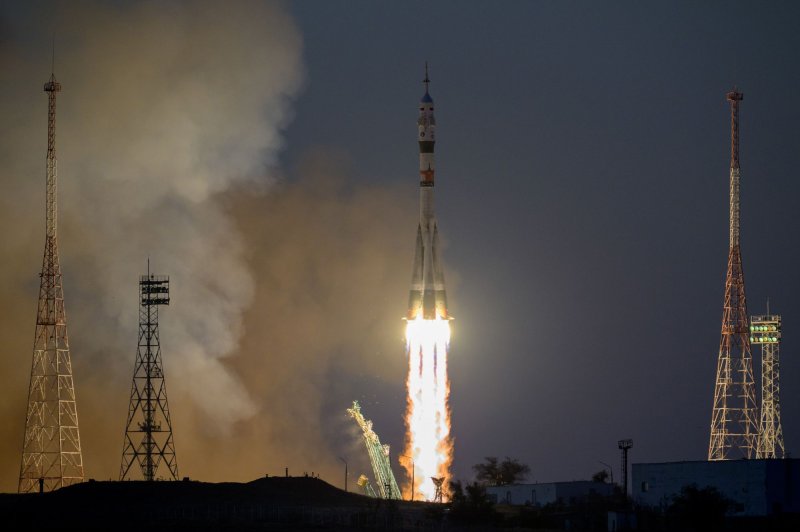1 of 10 | The Soyuz MS-22 rocket launched to the International Space Station with Expedition 68 astronaut Frank Rubio of NASA, and Russian cosmonauts Sergey Prokopyev and Dmitri Petelin of Roscosmos onboard Wednesday. NASA Photo by Bill Ingalls/UPI |
License Photo
Sept. 21 (UPI) -- Despite high political tensions, an American astronaut caught a ride to the International Space Station on Wednesday with two Russian cosmonauts on an expedition that will put him on the outpost for six months.
NASA astronaut Frank Rubio flew to the space station on Expedition 68 aboard a Soyuz MS-22 spacecraft, that launched from the Baikonur Cosmodrome in Kazakhstan just a few minutes before 10 a.m. EDT Wednesday.
The crew embarked on a roughly 3-hour trip to get to the space station where Rubio and the Soyuz successfully docked at 1:11 p.m. EDT.
NASA and its Russian counterpart Roscosmos reached an agreement in July to resume cooperative flights amid escalating tensions over Russia's war in Ukraine, which began in February.
Former Roscosmos chief Dmitry Rogozin threatened to pull cosmonauts off the station in April after the United States and other governments imposed punitive economic sanctions for the war in Ukraine.
"I think it's important that, when we're at moments of possible tension elsewhere, human spaceflight and exploration ... remains a form of diplomacy and partnership where we can find common ground and keep achieving great things together," Rubio said according to Space News.
Despite souring tensions between Washington and Moscow, NASA and Roscosmos worked out a deal for Russian cosmonauts and American astronauts to keep working together on the space station after decades of cooperation that began in 1998. Russian cosmonauts will catch a ride aboard an American flight later this fall when SpaceX delivers a new crew to the ISS.
Russia announced in July that it would move on from the International Space Station when it completes its obligations in 2024 and build its own permanent outpost in low Earth orbit. The move will end a 23-year collaboration with U.S., European and other partners.
Russia has lost significant revenue over the last few years because it no longer has to carry American astronauts into space. After the Space Shuttle was retired in 2011 and before SpaceX and NASA began working together, the United States paid tens of millions of dollars for seats on Russian rockets to get NASA's astronauts to the ISS.
![]()
Russian Orthodox Bishop Ignatii blesses the Expedition 68 Soyuz rocket at the Baikonur Cosmodrome in Kazakhstan on Tuesday. Photo by Bill Ingalls/NASA/UPI
Wednesday's was the first launch for Rubio, who's an active-duty Army astronaut and physician. He served as Expedition 68's flight engineer. Joining him on the flight were cosmonauts Dmitri Petelin, who's also flying his first mission, and Sergey Prokopyev.
Aboard the space station, the trio will join several other crew members from Expedition 67, including Russian Oleg Artemyev and three Americans.
Rubio's duties will entail a series of scientific and technical experiments, observational tasks and maintenance spacewalks. Previously, he was stationed in Fort Carson, Colo., and served as the surgeon for the 3rd Battalion, 10th Special Forces troops. He was among 10 people selected for NASA's 2017 astronaut class out of 18,300 applicants.
Rubio graduated from the U.S. Military Academy at West Point in 1989 and later received his medical degree from the Uniformed Services University of the Health Sciences. Notably, he piloted Blackhawk helicopters on more than 1,000 combat missions in Bosnia, Afghanistan and Iraq. He is the 18th Army astronaut to fly a mission to the space station.
NASA has recently awarded billions in private contracts to American companies to fly missions to the station or build spacecrafts for future flights. The space agency's top priority is the Artemis program, which will return humans to the moon for the first time since 1972.
Artemis I, an unmanned mission that will fly around the moon on a 42-day trip, is scheduled to launch on Sept. 27 after its first two attempts were unsuccessful.
American flags wave in the breeze after a second launch attempt was scrubbed for the Artemis 1 mission on Launch Pad 39B at Kennedy Space Center, Fla., on September 3, 2022. NASA plans to try again in the coming weeks. Photo by Pat Benic/UPI |
License Photo

















